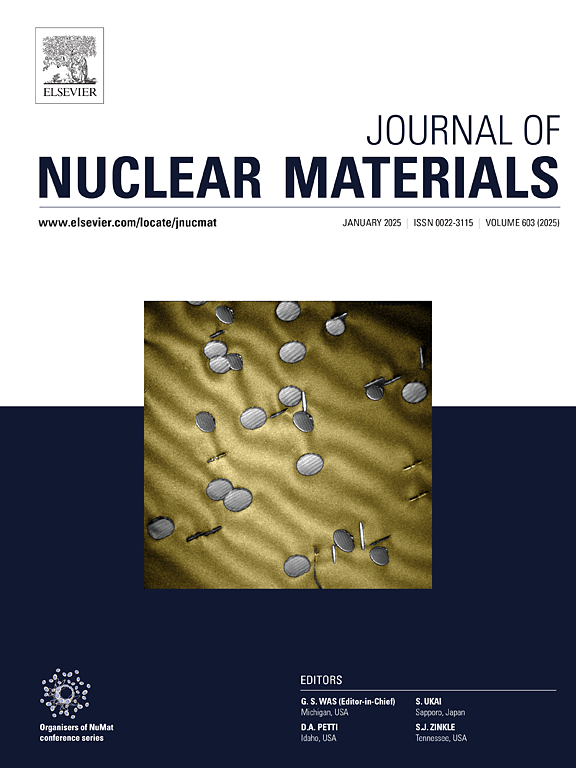氘对辐照钨中缺陷产生的影响
IF 2.8
2区 工程技术
Q3 MATERIALS SCIENCE, MULTIDISCIPLINARY
引用次数: 0
摘要
对于聚变试验反应堆和发电厂来说,氢同位素在炉壁材料中的滞留是一个重大问题。放射性稀缺燃料同位素氚的积累尤其令人担忧,但了解其他同位素(如氘)的保留情况也很重要。众所周知,氘会影响炉壁材料的机械性能,由于氘的使用比氚更安全,因此大多数实验都是针对氘的保留进行的。除了影响壁材的机械性能外,氘保留还被观察到会影响材料中的缺陷积累。在本研究中,我们研究了当氘存在于辐照过程中时,在钨中观察到的更大缺陷积累的现象和机制。我们利用分子动力学模拟和适当的分析工具进行了计算。我们发现,氘既会影响辐照钨中初级缺陷的产生,也会影响缺陷的重组率。本文章由计算机程序翻译,如有差异,请以英文原文为准。
The effect of deuterium on defect production in irradiated tungsten
For fusion test reactors and power plants, one significant concern is the retention of hydrogen isotopes in the wall materials. The build-up of the radioactive and scarce fuel isotope tritium is of special concern, but knowing the retention of the other isotopes, such as deuterium, is also important. Deuterium is known to affect the mechanical properties of the wall material and most experiments are carried out on deuterium retention as it is safer to use than tritium. In addition to affecting the mechanical properties of the wall material, deuterium retention has been observed to affect the defect accumulation in the material. In this study, we investigate the phenomena and mechanisms responsible for the greater defect accumulation observed in tungsten when deuterium is present during irradiation. This is achieved computationally, utilizing molecular dynamics simulations and appropriate analysis tools. We found that deuterium will affect both the primary defect production as well as the recombination rate of defects in irradiated tungsten.
求助全文
通过发布文献求助,成功后即可免费获取论文全文。
去求助
来源期刊

Journal of Nuclear Materials
工程技术-材料科学:综合
CiteScore
5.70
自引率
25.80%
发文量
601
审稿时长
63 days
期刊介绍:
The Journal of Nuclear Materials publishes high quality papers in materials research for nuclear applications, primarily fission reactors, fusion reactors, and similar environments including radiation areas of charged particle accelerators. Both original research and critical review papers covering experimental, theoretical, and computational aspects of either fundamental or applied nature are welcome.
The breadth of the field is such that a wide range of processes and properties in the field of materials science and engineering is of interest to the readership, spanning atom-scale processes, microstructures, thermodynamics, mechanical properties, physical properties, and corrosion, for example.
Topics covered by JNM
Fission reactor materials, including fuels, cladding, core structures, pressure vessels, coolant interactions with materials, moderator and control components, fission product behavior.
Materials aspects of the entire fuel cycle.
Materials aspects of the actinides and their compounds.
Performance of nuclear waste materials; materials aspects of the immobilization of wastes.
Fusion reactor materials, including first walls, blankets, insulators and magnets.
Neutron and charged particle radiation effects in materials, including defects, transmutations, microstructures, phase changes and macroscopic properties.
Interaction of plasmas, ion beams, electron beams and electromagnetic radiation with materials relevant to nuclear systems.
 求助内容:
求助内容: 应助结果提醒方式:
应助结果提醒方式:


